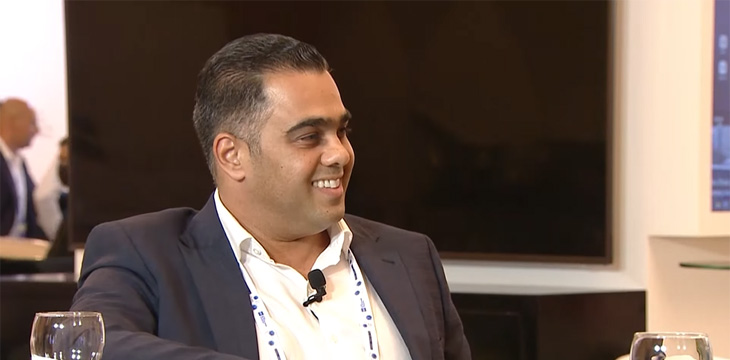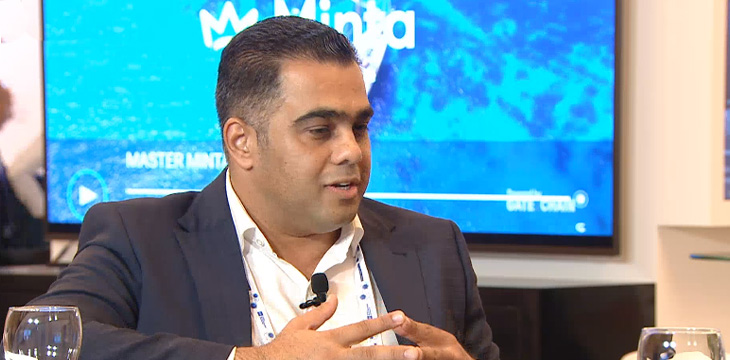
|
Getting your Trinity Audio player ready... |
https://www.youtube.com/watch?v=LFU0DVp87Qk
Raheel Iqbal has been in the gaming ecosystem for years now. He has seen gaming evolve from PC gaming to consoles to mobile devices and now onto the virtual reality era. As he told CoinGeek TV, the future lies in play-to-earn, and he believes that every major gaming company has to jump in or risk being phased out.
Iqbal is the CEO of Game Storm Studios, the largest gaming company in Pakistan with over 1,000 games published and over a billion downloads on app stores. He is also the CEO of OZI Group, a collective of companies targeting content creators and publishers.
Speaking to CoinGeek TV host Patrick Thompson at the BSV Global Blockchain Convention in Dubai, he revealed that taking Game Storm the play-to-earn way was a no-brainer. NFTs, the metaverse, and other blockchain phenomena are a fast-rising trend in the gaming world, and those who don’t catch on early risk losing the edge to their rivals, he believes.

“We’re trying to gain first-mover advantage and give our users a good blockchain-based GameFi experience,” he said.
As he explained, GameFi is the intersection of gaming and finance, with gamers getting a financial incentive for playing their favorite games. Currently, there is an estimated 3 billion gamers globally, and according to Iqbal, this is a potential gold mine for companies that get into GameFi early.
“Sooner or later, all the big app stores are going to turn to GameFi. They will introduce wallets and NFT marketplaces within their ecosystems,” Iqbal said.
Citing a study he had delved into during his BSV Global Blockchain Convention presentation, Iqbal noted that 60% of ‘hardcore’ PC gamers are open to migrating to P2E games. Mobile gamers, who are now the most predominant, are even more open to earning a buck or two while passing the time with their games.
Iqbal’s Game Storm Studios has predominantly produced free-to-play games. However, he is now exploring play-to-earn and has even deployed some of the games on the massively scaling Bitcoin SV enterprise blockchain network.
The first step, he said, is designing token economics. Once a developer or game publisher figures this out, he has to offer the user the same experience he has on the free-to-play version, and voila, a whole new world of opportunities opens up.
“You will see a big spike in terms of retention and user session time will double because now they are being incentivized,” he noted.
Indeed, studies have shown that P2E games have a higher retention rate, and their users spend more time gaming, with one study even saying the user sessions spike fivefold.
On why he chose to build on BSV, Iqbal told CoinGeek TV, “We have put some of our games on the BSV blockchain and the users are happy because the minting fees are [near] zero, the micropayments are robust and players can cash out on a daily basis.”

Game Storm is also planning to launch an app store for P2E games which will have “one token for all,” all based on BSV, he told Thompson.
The BSV enterprise blockchain has proven it’s the best blockchain network for gamers. Popular games like CryptoFights are able to facilitate millions of transactions daily, all on-chain, without any lag and at fractions of a penny for each.
The importance of BSV’s ability to scale unbounded can’t be overstated, especially in light of the Axie Infinity debacle. Axie was using a bridge since Ethereum, on which it’s built, can’t scale and is very costly. This bridge was exploited, and $625 million was stolen.
For the GameFi ecosystem, NFTs play a big role, Iqbal continued. These tokens are being used to signify ownership of gaming items, and since they are on-chain, they can then be sold off to other gamers, or even non-gamers in the blockchain ecosystem. Axie Infinity has shown just what is possible, and games such as CryptoFights prove it can all be done on-chain.
Watch: The BSV Global Blockchain Convention presentation, Play2Earn with BSV Blockchain
https://www.youtube.com/watch?v=ggbZ8YedpBE&t=6967s

 11-22-2024
11-22-2024


